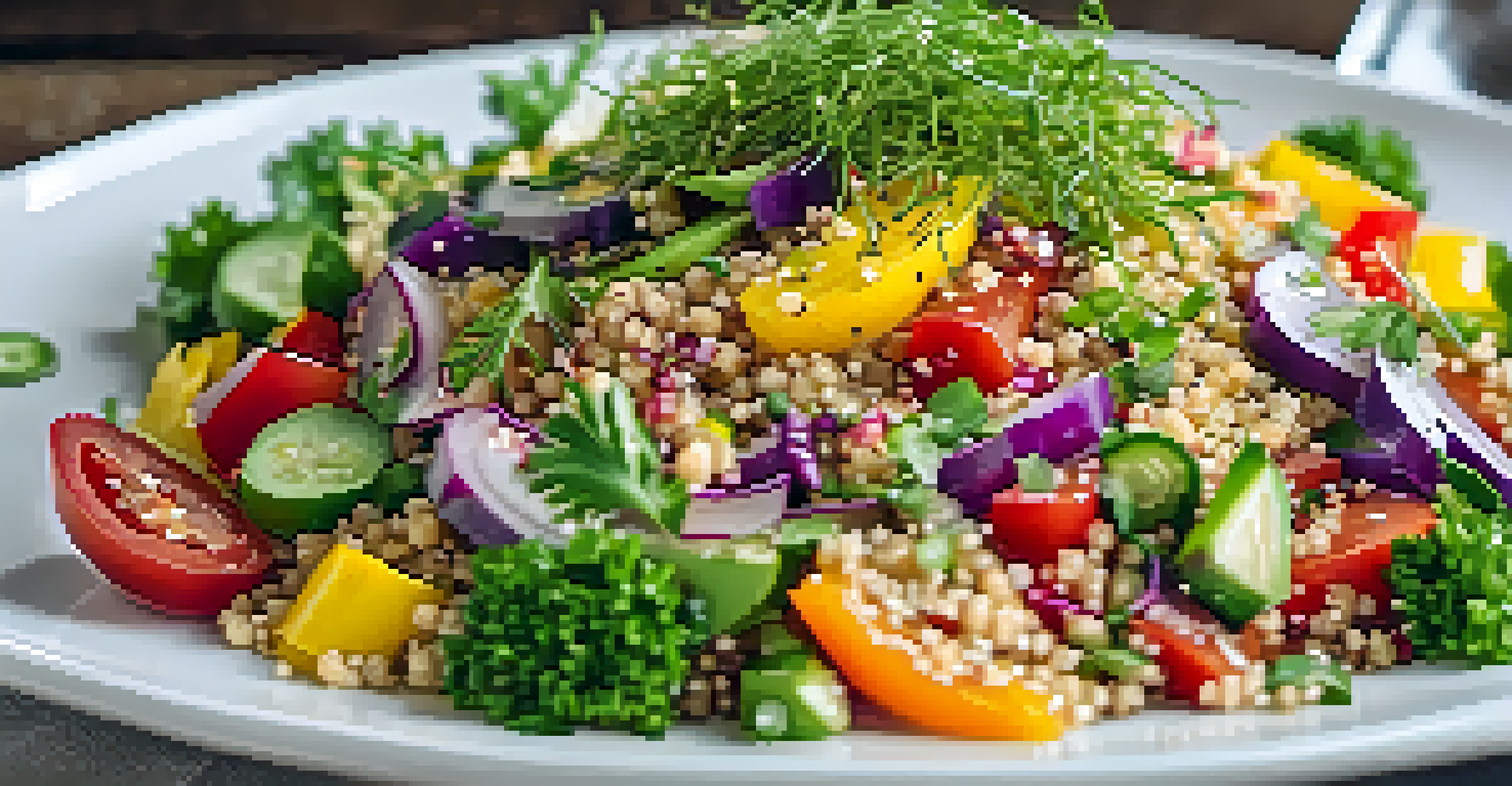Exploring the Benefits of a Whole-Food Plant-Based Diet

What is a Whole-Food Plant-Based Diet?
A whole-food plant-based diet focuses on eating minimally processed foods primarily from plants. This includes fruits, vegetables, whole grains, legumes, nuts, and seeds. By emphasizing whole foods, you reduce the intake of added sugars, unhealthy fats, and artificial ingredients, leading to a more nutritious way of eating.
Let food be thy medicine and medicine be thy food.
Think of it as a return to the basics, where the food on your plate looks more like it does in nature. For instance, instead of grabbing a processed snack, you might enjoy a handful of almonds or a vibrant salad. This approach not only enhances your meals but also supports sustainable farming practices.
By choosing whole foods, you're not just benefitting your health; you're also making a positive impact on the environment. It’s a win-win that encourages both personal wellness and ecological responsibility.
Health Benefits of a Plant-Based Diet
One of the most compelling reasons to adopt a whole-food plant-based diet is its numerous health benefits. Research suggests that this diet can lower the risk of chronic diseases like heart disease, diabetes, and certain cancers. The abundance of vitamins, minerals, and antioxidants found in plant-based foods plays a crucial role in promoting overall health.

For example, a diet rich in fruits and vegetables tends to lower blood pressure and improve cholesterol levels. Imagine swapping out a greasy burger for a hearty quinoa bowl packed with veggies; you’re not just making a meal choice, you’re investing in your long-term health.
Benefits for Health and Wellness
A whole-food plant-based diet can lower the risk of chronic diseases while boosting energy levels and improving mood.
Moreover, many people report increased energy levels and improved mood when transitioning to a whole-food plant-based diet. This boost in vitality can help you feel more engaged in daily activities and enjoy life to the fullest.
Weight Management and a Plant-Based Lifestyle
Struggling with weight management? A whole-food plant-based diet might be your solution. These foods are often lower in calories but high in fiber, which helps you feel full longer. This means you can enjoy larger portions without the guilt, making it easier to stick to your health goals.
The greatest threat to our planet is the belief that someone else will save it.
Think of it this way: when you fill your plate with colorful veggies and hearty grains, you’re satisfying your hunger while nourishing your body. Plus, many people find that they naturally gravitate toward healthier choices as they explore new recipes and cooking methods.
Over time, this shift in diet can lead to sustainable weight loss and a healthier relationship with food. It’s about creating habits that help you thrive rather than focusing solely on the scale.
Improved Digestive Health with Plant Foods
Fiber is a star player in a whole-food plant-based diet, and it’s essential for digestive health. Foods like beans, lentils, and whole grains are packed with fiber, which helps keep your digestive system running smoothly. This can lead to regular bowel movements and reduced risks of digestive disorders.
Imagine your gut as a bustling city; fiber acts like the traffic signals that keep everything flowing efficiently. Without enough fiber, things can get backed up, leading to discomfort and health issues.
Support for Sustainable Living
Choosing a plant-based diet requires fewer resources and helps reduce your carbon footprint, promoting environmental sustainability.
Incorporating a variety of plant-based foods not only improves digestion but also fosters a healthy gut microbiome. A balanced gut can boost your immune system and even enhance your mood—talk about a powerful connection!
Environmental Impact of a Plant-Based Diet
Adopting a whole-food plant-based diet isn’t just beneficial for your health; it also has a positive impact on the environment. Plant-based diets generally require fewer natural resources, such as water and land, compared to diets high in animal products. This shift can significantly reduce your carbon footprint.
For instance, producing one pound of beef requires about 1,800 gallons of water, while growing vegetables and grains uses far less. By choosing plants, you’re making a conscious choice to preserve our planet’s resources for future generations.
Furthermore, supporting plant-based agriculture helps promote biodiversity and sustainable farming practices. Making informed food choices can lead to a healthier planet, one bite at a time.
Culinary Creativity and Joy in Cooking
Transitioning to a whole-food plant-based diet can ignite your passion for cooking and inspire culinary creativity. With a vast array of fruits, vegetables, grains, and legumes at your fingertips, the possibilities are endless. You might find joy in experimenting with new recipes and flavors you never thought to combine.
Imagine whipping up a colorful stir-fry with seasonal vegetables or crafting a delicious chickpea curry. The vibrant colors and textures not only make your meals appealing but also offer a delightful experience for your taste buds.
Culinary Creativity and Enjoyment
Transitioning to this diet can inspire a passion for cooking, allowing you to experiment with diverse ingredients and flavors.
This newfound approach to cooking can foster a deeper appreciation for food and its origins. You’ll likely find satisfaction in creating nourishing meals that are both delicious and good for you.
Getting Started on Your Plant-Based Journey
Ready to dive into a whole-food plant-based diet? Start by making small changes to your meals. Incorporate more plant-based foods gradually, like adding an extra serving of vegetables to your dinner or swapping dairy for nut-based alternatives. These small steps can make the transition feel more manageable and enjoyable.
Join online communities or local groups that focus on plant-based living. Sharing recipes and tips with others can provide motivation and inspiration, making your journey feel less solitary. Plus, you might discover new favorite dishes along the way!

Remember, the goal isn’t perfection but progress. Embrace the journey, and enjoy the delicious and nutritious foods that a whole-food plant-based diet has to offer.